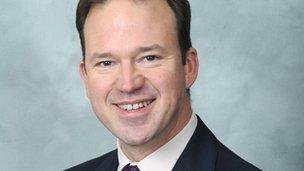Muzzled?
- Published
Has the government just tightened, ever so slightly, its grip on the windpipe of Parliament?
The appointment of several MPs to the Conservatives' new Parliamentary Advisory Board is interesting for all sorts of reasons: the personnel are impressive and the mandate to inject more Toryism into government policy should produce plenty of action.

Jesse Norman is one of the MPs promoted in the latest appointments
But does it also enmesh, if not totally muzzle, quite a number of important backbench figures. In particular, Jesse Norman, who spearheaded the successful rebellion against Coalition plans to overhaul the House of Lords, and George Eustice who rallied backbench support for a Leveson-style press regulation system, have been brought inside the tent.
Neither may have any great plans to defy the party line in hand at the moment, but both would find it difficult to combine membership of this new body with any new defiance of the whips. And the same applies to the other members: Jane Ellison, Paul Uppal, Nick Gibb, Peter Lilley and Jake Berry.
Are all these eminent folk - now part of the government payroll vote - bound to toe the line on pain of resignation? This matters because the payroll - the list of ministers and whips and Parliamentary Private Secretaries (PPSs) and chairmen, deputy chairmen and assistant chairmen at party HQ, who're all expected to support the government - is an important factor in Commons votes.
They represent a kind of parliamentary baseline for the whips; the people they can safely assume will vote as expected. Over the years, the number of ministers and PPSs has crept upwards, encompassing an ever larger share of government MPs, and by implication limiting the number of potential rebels, because defiance means resignation.
And successive governments have become adept at creating not-quite-ministers who become part of an unpaid payroll vote...an MP who is the prime minister's personal envoy on this, or policy advisor on that, will think carefully before ditching their role.
Now, in the PAB, David Cameron has created a whole new institution, which has brought a handy contingent of MPs inside the governmental tent. And what about the new policy supremo, Jo Johnson (who must be heartily sick of seeing his career discussed purely in terms of its implications for big brother Boris), what will his role be? He takes up residence in the increasingly crowded precincts of the Cabinet Office (which now contains a record 10 ministers*), while retaining his rank as an assistant whip and the £26,000 salary top-up it brings. He certainly remains a member of the government, but I wonder how much whipping he'll do, from now on?
Of course the PAB will only limit the freedom of action of its members if it's worth being a member. If they have inside track access to documents and top-table ministers, and if their ideas are taken seriously and injected into government policy or the next manifesto, membership will be worth having. But if they find themselves playing in some political Wendy House, those MPs might be soured rather than co-opted.
* Nick Clegg, Ken Clarke, Francis Maude, Oliver Letwin, David Laws, Nick Hurd, Chloe Smith, Jo Johnson (alright, he's a whip, not a minister), Grant Shapps and John Hayes.